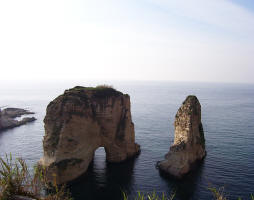 UN warns water needs growing more urgent
UN warns water needs growing more urgent
The international
community needs to start creating strategies for using water more
efficiently and sharing it more fairly, UN Secretary-General Ban Ki-moon has
said, warning that unless action is taken soon, the conflicts and problems
caused by water shortages around the world will multiply. In an opinion
column published in 'The Hindu' newspaper of Chennai, India, ahead of
observances this week to mark World Water Day, Ban called for partnerships
between governments, civil society groups, businesses and individuals to
better use and conserve water.
'We are at the early stages of this awakening,' he wrote. 'But there are some encouraging signs, especially in the private sector. Corporations have long been viewed as culprits. The smokestacks from power plants pollute our air; the effluents from industry spoil our rivers. But this is changing - more and more today, businesses are working to become part of the solution, rather than the problem.'
Ban cited the gathering earlier this month in New York of the UN Global Compact, the world's largest voluntary corporate citizenship initiative, on the subject of water.Participants engaged in the sharing of best and emerging pratices of water-related direct operations, supply chain management, watershed protection, transparency, public policy, community engagement, and collective action.
These areas constitute the major elements of The CEO Water Mandate, launched by the UN Secretary-General in July 2007 to engage companies on the emerging crisis in fresh water availability and sanitation. To date the chief executives of 20 companies have endorsed The CEO Water Mandate.
Ban stressed that it is important to move 'beyond the mere use of water to stewardship,' given how scarce fresh water is becoming in so many regions of the world, both rich and poor.
Many of the conflicts around the world erupt or are worsened by water shortages, he said.
'International Alert has identified 46 countries, home to 2.7 billion people, where climate change and water-related crises create a high risk of violent conflict. A further 56 countries, representing another 1.2 billion people, are at high risk of political instability.'
'That's more than half the world,' Ban observed.
The secretary-general said population growth and climate change will worsen the situation, observing that already one child dies every 20 seconds from a disease associated with a lack of clean water.
Helping people living 'in the most abysmal standards of hygiene and sanitation' would not only reduce the death toll, Ban said, but would also assist in protecting the environment, alleviating poverty and fostering economic development.
'Water is a classic common property resource,' he said. 'No one really owns the problem. Therefore, no one really owns the solution.'
On Friday, the UN released figures showing that more than 100 million Europeans still lack access to safe drinking water, resulting in the deaths from diarrhea of nearly 40 children across the region every day.
More than 170,000 cases of water-related diseases - including over 120,000 cases of viral hepatitis A - were reported in 2006.
In Eastern Europe, some 16 percent of the population does not have access to drinking water in their homes, while in rural areas, more than half of all people do not have a reliable supply of safe water and adequate sanitation.
A new and independent Compliance Committee has been created to promote the prevention, control and reduction of water-related diseases and to increase the number of Europeans who have access to adequate sanitation.
The committee aims to ensure compliance with the London Protocol on Water and Health to the Convention on the Protection and Use of Transboundary Watercourses and International Lakes, which seeks to increase access to safe water.
The new committee, which was established by the UN Economic Commission for Europe and the Regional Office for Europe of the UN World Health Organization, is made up of nine experts, including scientists and environmental lawyers.
World Water Day 2008 will be celebrated by the UN on Thursday. HRH the Prince of Orange will attend the celebrations in Geneva. In 2008, the day will highlight issues on sanitation in accordance with the International Year of Sanitation 2008.
In the United States many water and sanitation events are planned. World Walk for Water will be held in New York, Los Angeles and Seattle. In New York, join International Medical Corps, UNICEF, WaterAid, Project Concern International, Starbucks and Ethos Water at Riverside Park for a series of speakers from participating organizations and a one mile walk.
| Contact information | n/a |
|---|---|
| News type | Inbrief |
| File link |
http://www.environmental-expert.com/resultEachPressRelease.aspx?cid=4797&codi=29133&loginemail=jauad.el-kharraz@semide.org&logincode=151743 |
| Source of information | Environmental-expert - Source: Environment News Service (ENS) |
| Subject(s) | DRINKING WATER AND SANITATION : COMMON PROCESSES OF PURIFICATION AND TREATMENT , POLICY-WATER POLICY AND WATER MANAGEMENT , PREVENTION AND NUISANCES POLLUTION , RISKS AND CLIMATOLOGY , SANITATION -STRICT PURIFICATION PROCESSES , WATER DEMAND , WATER QUALITY |
| Relation | http://www.semide.org/topics/sanitation |
| Geographical coverage | International |
| News date | 20/03/2008 |
| Working language(s) | ENGLISH |
 you are not logged in
you are not logged in





